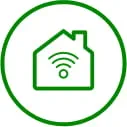In this digital era, staying connected is not just a luxury but a necessity. Meet the powerhouses that keep you online: cellular data and home WiFi. Cellular data, used by your mobile phone, connects you to the internet, while WiFi is commonly used at home or in public spaces. You might have used your phone's mobile hotspot to connect in public, but can it replace your home internet? Let's explore.
What is cellular data?
Cellular data operates through cell towers, transmitting data across large areas. Towers, managed by carriers, provide coverage within their regions. Advancements in fourth generation (4G) and fifth generation (5G) networks have improved cellular data speeds, although actual speeds vary based on factors like network congestion and distance from towers.
What is home WiFi?
On the flip side, WiFi works by using radio waves to establish a local area network (LAN) with a limited range. This range typically extends only a few hundred feet, making it suitable for supplying high-speed internet access within confined spaces like buildings or rooms. WiFi offers the advantage of consistent and often faster speeds compared to cellular data. WiFi networks can also handle larger amounts of data because they work within a smaller area. For the fastest home internet in America, Ziply Fiber stands out with 50 gigabits per second for both uploads and downloads.
See our post about how Gig speed is not the same as “G".
It's important to note that WiFi and cellular data are independent modes of connectivity — they don't operate simultaneously. When you're connected to WiFi, your device exclusively uses that network for internet access. Conversely, in the absence of a WiFi connection, your device automatically switches to using cellular data.
Personal hotspots as home internet
Your mobile phone’s hotspot feature allows you to share its cellular data connection with other devices, offering flexibility and portability. It's great for those on the move or in areas with unreliable WiFi.
Using your mobile hotspot for home internet can offer several advantages. Its flexibility and portability mean you can access the internet wherever you have cellular coverage, making it a great option for those frequently on the move or residing in areas with unreliable or slow traditional WiFi options.
Setup is quick and user-friendly, requiring just a few taps on your phone's settings. Additionally, if your data usage is relatively low and your mobile plan offers ample data allowances, it can be a cost-effective choice. Mobile hotspots can also serve as a temporary or backup solution, ensuring you stay connected during home internet setup or outages.
Furthermore, you have more control and security, as you can manage connected devices and set up access passwords.
Downsides of using your mobile hotspot for home internet
Using your mobile hotspot for home internet offers convenience, but it comes with several notable downsides. One important consideration is how the data consumed by devices connected to your hotspot contributes to your data plan usage. Unless you have an unlimited data plan, this could lead to unforeseen costs as your data usage increases. It's advisable to regularly check your data allocation through your carrier's customer portal or billing information.
Additionally, relying on a mobile hotspot can result in compatibility issues with smart devices. Many of these devices, such as smart thermostats, security cameras and voice assistants, rely on a stable WiFi connection. Connecting them to a mobile hotspot may not be possible, limiting their functionality and disrupting your smart home setup.
Moreover, surpassing your data plan's limits can result in a considerable drop in connection speed. This can be particularly frustrating when trying to stream content, play online games, or engage in activities that require a consistent and fast internet connection. Staying vigilant about your data usage is crucial to avoid encountering these slowdowns and potential extra charges.
Lastly, the continuous use of your device as a hotspot can significantly drain its battery. To counteract this, you'll likely need to keep your device plugged in, invest in external battery packs, or constantly manage battery life, all of which can be cumbersome and add extra costs to your makeshift home internet solution.
Can a mobile hotspot replace my home internet plan?
It's nuanced. For minimal data needs and few smart devices, a hotspot could work. But, if cost worries you, explore affordable home internet plans with predictable costs and no data caps. Many providers offer cost-effective plans that can be customized. Bundling or discounts can reduce phone and internet bills. Government programs like ACP aim to make internet access more affordable.
The world of connectivity offers two powerful allies: cellular data and home WiFi. Understanding their intricacies and using them smartly empowers you to stay seamlessly connected, whether you're on the move or in the comfort of your own home .






